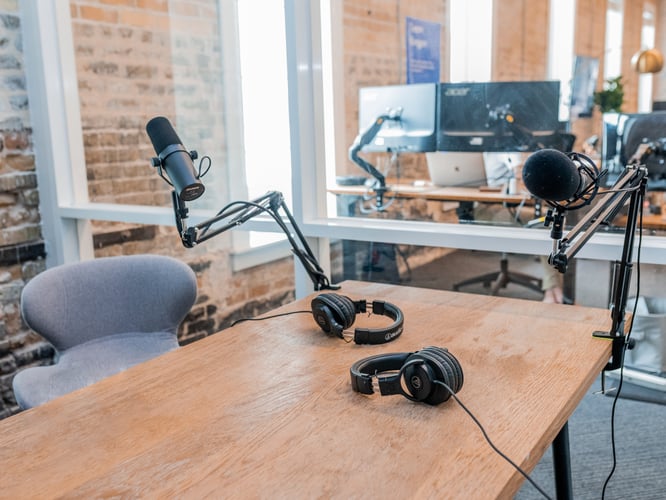Relax, You’re an Expert: 5 Tips for How to Prepare for a Media Interview

Think back to your first interview. It was probably something you did for the first time for your first job. If it was anything like mine, it involved sweaty palms, jumbled responses, and a pair of oversized dress shoes you purchased at a steep discount as part of a Halloween costume.
Answering an unpredictable series of questions about yourself, while trying to emphasize your potential value, can be stressful. But, as I’ve learned during my time on Propllr’s media relations team, not all interviews are set up this way.
Media interviews present a unique opportunity to share your message (or your brand’s message) with the public.
In this post, I’ll share five media interview tips to help thought leaders like you capitalize on these opportunities and position your company in its best light.
Media Interview Tip #1: Take Time to Prepare
Journalists don't usually share a list of questions beforehand, but they’ve likely already laid out a general framework and communicated the overall theme of the interview to you. And there are always a few questions every reporter will ask.
This gives you a better opportunity to prepare. Before your media interview...
- Know at least one key message you want to get across.
- Think of a good simile or metaphor to explain your topic – those are like catnip to reporters.
- Mentally run through what questions you know are likely to come up.
- Think about the interview topic beforehand.
- Jot down a few anecdotes or examples you want to share (but avoid scripting out entire answers – more on this later).
- Reach out to your marketing team to get an updated list of information and company metrics you can share publicly.
In media interviews, journalists are gathering information, and your preparedness shows respect for their time by making sure you’re ready to provide the information they need.
If you realize you don’t have a lot to say on the topic as you prepare, it might be a sign that this interview isn’t right for you in the first place. You can save everyone time and embarrassment by politely canceling (with plenty of notice) or referring them to someone else at your organization or network.
Media Interview Tip #2: Keep Your Own Objectives Top of Mind
Whether you're being interviewed for the local news or for a popular national podcast, the reporter is gathering insights to build a bigger story. They’re looking for you to transmit information that you have that they need, and it’s important to focus on the part of the story you can contribute and what you can control.
Are you looking to raise your profile as a thought leader by providing insights to this particular publication? Is your company hoping to promote a message that’s tied to a current marketing campaign?
Whatever outcome you’re hoping for, your primary goal should be to pass along information about your experiences and expertise in a clear, helpful and easy-to-understand way. Keep this in mind to eliminate some of the nerves naturally associated with question-and-answer sessions.
Media Interview Tip #3: Use the Interview Format to Your Advantage
While some journalists opt for a video chat or (pre-COVID-19) in-person meeting, media interviews usually happen over the phone. Eliminating the visual aspect of the interview can be a positive thing, as it lessens the chance of conscious and unconscious visual biases skewing either party’s perception of the interaction.
But it also eliminates some of the visual cues we rely on for nonverbal communication. Make an extra effort to sound helpful, friendly, and engaged, and embrace the biggest advantage of phone interviews: bring notes to bolster your talking points.
The best interviews are real, human-to-human conversations (even if you can’t see the other human). Don’t let your prep interfere with building a connection with your interviewer.
Media Interview Tip #4: Be Confident – You Have All the Answers
The interview questions will inherently be tailored to things you know about: your company, your experiences, and your real-world knowledge.
If you find that something you say seems to surprise your interviewer, it’s not likely because it was “incorrect” – it’s because you’re offering a unique perspective or explaining a tired topic in a new way. And that’s the reason you’re being interviewed: to provide valuable insight their readers, listeners, or viewers need.
Even the most well-read journalists don’t have the practical knowledge that comes from spending every day working within your industry. This is why they seek out thought leaders and experts like you. By remaining self-assured, you can bring their research to life with your real-world insight.
Media Interview Tip #5: Talk About Yourself
Be sure to talk about yourself. This might seem obvious, but some interviewees feel inclined to answer as a neutral observer as opposed to an active participant. Yes, focusing on your own work can feel strange or self-centered, as it’s generally considered rude to only talk about yourself, but the journalist is interviewing you for your perspective.
While sometimes that requires mentioning outside organizations, doing so can sidetrack the conversation from its primary goal. The journalist is interviewing you because you’re an expert. Don’t give them a reason to talk to someone else.
How to Prepare for Your Next Media Interview
It doesn’t matter if it’s a potential employer or a curious journalist asking the questions – interviews can be tough.
But media interviews aren’t pop quizzes, they’re (typically) a mutually beneficial discussion between knowledgeable, curious, and engaged people.
By owning your narrative and knowing your talking points, you can position yourself and your company well, provide valuable information to the media, and earn great media coverage that helps achieve your PR goals.
Want to discuss your narrative and PR goals? Grab some time with our CEO Josh!








